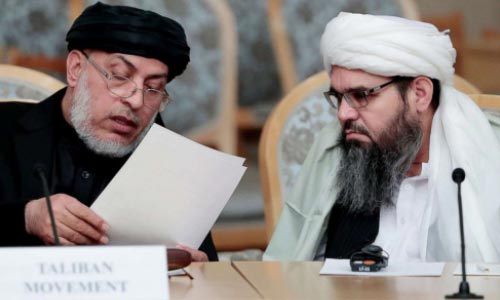KABUL - A US-based research Centre has prepared a potential peace agreement in Afghanistan, but independent analysts insist that a formal deal is yet to be achieved.
Taliban representatives and the US special envoy for reconciliation in Afghanistan, Zalmay Khalilzad, recently met in Qatar and the United Arab Emirates on the peace process.
Media reports suggest that a draft agreement among the Trump administration, Taliban and the Afghan government had been prepared.
The 50-page draft accord -- Agreement on settlement of the conflict in Afghanistan -- pertains to the the peace process, a future system and withdrawal of US troops from Afghanistan.
The RAND Corporation has developed the draft agreement and the document has been shared with senior Afghan officials in Kabul, as well as with stakeholders in the region.
In the context, an 18-month transitional government, extension of US assistance to Afghanistan, creation of a high ulema council, changes to the constitution, amnesty, Taliban’s complete renunciation of links with terrorist organizations, release of prisoners and formation of an impartial team to implement the draft deal are the main points.
At the end of the draft agreement, spaces have been provided for signatures of leaders from Afghanistan, Pakistan and other regional countries.
Also, there are also unconfirmed reports that the two sides have outlined their views on 50 percent of the issues and will share them at the meeting.
Wahid Muzhda, a Kabul-based political analyst, called the RAND Corporation \a credible source. The think-tank has interviewed him in this regard, the observer said.
About the draft deal, he said: “What isn’t seen in it is the Bilateral Security Agreement between the US and Afghanistan. This agreement is unacceptable to the Taliban.”
Without going into details, Muzhda said individuals close to the Taliban had prepared their own peace agreement. Many issues in the peace process were still vague and the Taliban themselves did not know would happen next.
“Some topics are still being discussed behind the scenes, as both sides (Taliban and the US) don’t want the media to debate them,” Muzhda added.
Taliban made four demands at the first meeting with the US -- an exact date of the US withdrawal from Afghanistan, remove of Taliban leaders’ names from the blacklist, exchange of prisoners and recognition of their office in Qatar, he explained.
Muzhda said none of the demands had been met so far, as the the two sides had only a few meetings.
“The Taliban tend to pull out of any process that doesn’t lead to a positive outcome. But they haven’t yet walked out this process and have held talks with representatives from several other states.
“It seems something substantial is there. This (US-Taliban dialogue) is a good opportunity. There is a sense of optimism,” the commentator continued.
Nazar Mohammad Mutmain, another analyst, said: “RAND Corporation has ascertained views of Afghan, regional and international actors.”
Mutmain said RAND Corporation’s senior researcher Laurel Miller, who helped compile the draft deal, had spoken to him as well.
No formal agreement had been reached yet, the expert said, indicating the two sides could achieve a breakthrough at the Qatar meeting.
The US troop withdrawal would be one of the main topics for discussion in Doha, he believed, hoping for concrete progress at the next meeting.
A peace activist close links to Taliban, Inayatullah Kakar, told Pajhwok Afghan News that RAND Corporation’s plan was a draft -- but not an ineffective one. It covers most of Afghanistan-related facts and issues.
According to Kakar, Khalilzad’s wife is also working with RAND research centre in a senior position. With this in mind, he thinks, there has been coordination between the research centre and the US envoy.
He added RAND Corporation, popular with many US policymakers, had drafted security plans in many cases. Most of the plans had been implemented by the US government, he continued.
“It looks this draft agreement has been demanded by the US administration and it may have been leaked deliberately to generate a debate on the issue -- a process that will help identify and rectify flaws in the proposed accord,” Kakar commented.
Kakar suggested: “It will be good for the US, especially for Khalilzad, to share the draft deal with Afghan stakeholders at seminars, workshops and other gatherings. It will help forge a consensus ….”
The Taliban have not yet commented in this regard. But Chief Executive Dr. Abdullah’s office has rejected reports regarding any agreement between the Taliban and US.
CEO spokesman Faridoon Khwazoon said any decision excluding the Afghan government was mere speculation. The Afghan government alone reserved the right to make decisions.
He said the US and regional countries were trying to pave the way for talks between the Taliban and Kabul. (Pajhwok)
Home » Afghanistan » Rand Corporation’s Peace Deal Viewed as a Proposal
Rand Corporation’s Peace Deal Viewed as a Proposal

